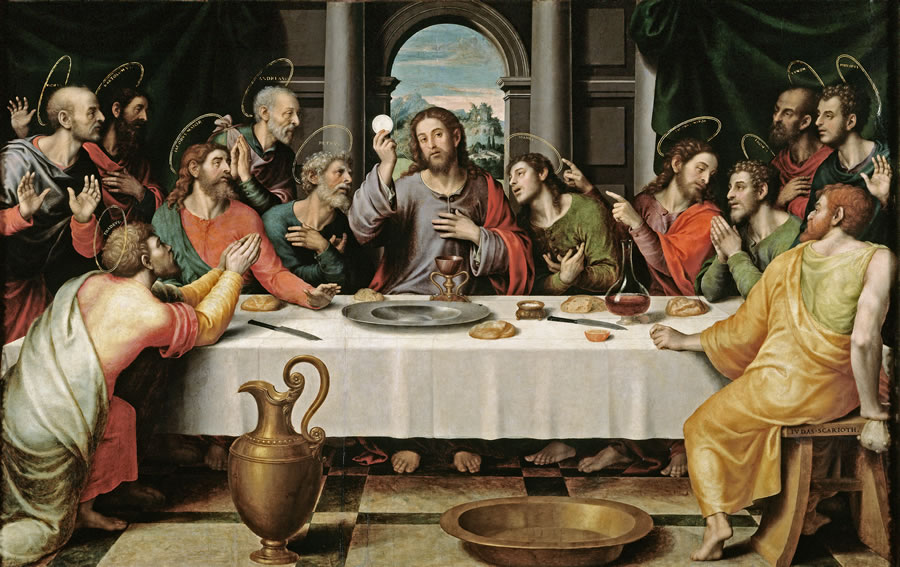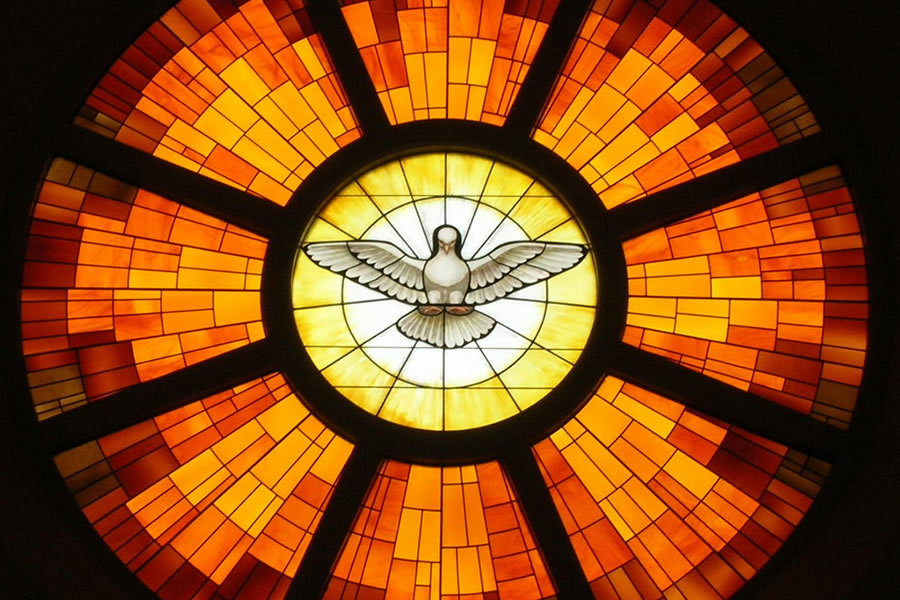
The Solemnity of the Most Holy Body and Blood of Christ Corpus Christi - Ex 24: 3-8; Heb 9:11-15; Mk 14:12-16, 22-26
05-31-2024Weekly ReflectionThe Faithful DiscipleGROW: The Feast of Corpus Christi celebrates the great Christian mystery of the Eucharist – that Jesus Christ is really, truly, and substantially present under the appearances of bread and wine. At the Last Supper, Jesus breaks the bread and passes the cup of wine, telling his disciples to take, and eat, this is his body and blood. In the Old Testament, as we saw in the first reading, blood was seen as both a sacrifice and a covenant, a promise between God and his chosen people. Jesus says he is the new covenant, and instructs his disciples to do as he has done, in memory of him. The layers to what Jesus is saying are many: He is the new promise between God and people; he will be the sacrifice; and yet he will remain with them when they partake in the Eucharist. The salvation of all people is wrapped up in this seemingly simple act of eating bread and drinking wine because Jesus transcends time, just as he transcended death, to be truly present to us in the sacrament. What a profound and beautiful act of love! One we can barely begin to understand with our human minds. The first disciples likely didn’t understand it either, at least not at first. But with time, and with the wisdom of the Holy Spirit, they came to see just how transformative that Passover meal was.
READ MORE
The Solemnity of the Most Holy Trinity - Dt 4:32-34, 39-40; Rom 8:14-17; Mt 28:16-20
05-24-2024Weekly ReflectionThe Faithful DiscipleGROW: Today is an opportunity to reflect on and celebrate the mystery of the Holy Trinity: One God, two natures (Jesus is fully human and fully divine), and three divine persons. Whenever I think about this feast, I am reminded of some wise words I heard once from a professor, although I am paraphrasing: It’s not necessary to try to describe in theological terms what God is, for no matter what we say it will be inadequate to the reality of the ultimate grandeur of God. What is important, and what affects people day to day, is talking about who God is, and how God is. And so this Trinity Sunday is a day to reiterate that which is most fundamental to our understanding and belief: God is love. Not just God is loving, or God loves, but God is love itself. He is a continual outpouring of selfless love – agape is the Greek word – which brought forth creation, and all creatures to share in it. It is a communion of love by which and for which we were created; we are meant to emulate and live that same relational communion of love with one another.
READ MORE
Pentecost Sunday - Acts 2:1-11; 1 Cor 12:3b-7, 12-13 or Gal 5:16-25; Jn 20:19-23 or Jn 15:26-27; 16:12-15
05-17-2024Weekly ReflectionThe Faithful DiscipleGROW: Pentecost Sunday is here! If ever there was a day in the Church calendar to celebrate the transformational power of Christianity, this is it. We know from the first reading how the disciples go from being huddled and afraid in a locked room to stepping out boldly in the streets, loudly proclaiming the Good News of Jesus. What changed them so suddenly? It was the coming of the Holy Spirit, the third divine person of the Trinity, into their hearts and lives. Jesus calls the Spirit an Advocate, “the Spirit of truth,” who will remain with the apostles after he has left. That same Spirit is promised to us, continuing the Easter joy. It is only through the power and grace of the Holy Spirit that we have the knowledge, ability, and courage to proclaim Jesus as our Lord. Only in this way can we belong to Jesus and be in relationship with the Father. The very same God who created all things is here to help us become the sons and daughters he always envisioned us to be.
READ MORE
Solemnity of the Ascension of the Lord - Acts 1:1-11; Eph 1:17-23; Mk 16:15-20
05-10-2024Weekly ReflectionThe Faithful DiscipleGROW: It’s easy for me to get impatient with the Lord – to wonder why he makes me wait for an answer to a prayer or, worse, why his answer may be no. However, when I look back at the lessons of the Bible, it becomes clear that God works on his timetable, not mine. That same message comes through in today’s first reading. The apostles ask Jesus whether he will be restoring the kingdom to Israel, and he is clear in his answer: “It is not for you to know the times or seasons that the Father has established by his own authority.” And then, after saying this, he ascends to the Father. Forty days after his resurrection, Jesus has left his disciples again. But instead of leaving them to weep and mourn – as happened after his death – this time, our Lord left them with a mission. They were to “Go into the whole world and proclaim the gospel to every creature.” They did, faithfully, and they traveled far and wide. Armed with the gift of the Holy Spirit which they received at Pentecost, they baptized countless people as they shared the Good News about Jesus and his gift of salvation.
READ MORE
Sixth Sunday of Easter - Acts 10:25-36, 34-35, 44-48; 1 Jn 14:23; Jn 15:9-17
05-03-2024Weekly ReflectionThe Faithful DiscipleGROW: “As the Father loves me, so I also love you … If you keep my commandments, you will remain in my love.” We don’t earn God’s love – it is freely given to us. But only by loving God and others, and by keeping his commandments, do we remain in that love as our source of life and joy. It becomes the air we breathe, and the breath we exhale. Today’s second reading and Gospel reassure us of the love of God, but also give us a few specifics for how to live in and remain in that love – self-sacrifice and prayer. We are to love one another as Jesus loves us, and we know what that looks like from his life: feeding the hungry, caring for the sick, forgiving one another, and more. Living in the way Jesus instructs is not simply completing a checklist of things to do, however. It’s a way of life – to live in God’s love and to demonstrate his love with our outward actions. When we do so, we are helping bring about the kingdom in a very real way. It’s not complicated. We begin by acting in accordance with the truth that the person in front of us is loved by God.
READ MORE